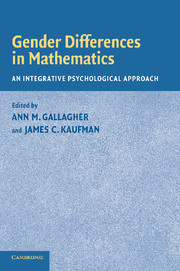Book contents
- Frontmatter
- Contents
- Preface
- Acknowledgments
- List of Contributors
- 1 Research on the Women and Mathematics Issue: A Personal Case History
- 2 The Perseverative Search for Sex Differences in Mathematics Ability
- 3 A Psychobiosocial Model: Why Females Are Sometimes Greater Than and Sometimes Less Than Males in Math Achievement
- 4 Gender Differences in Math: Cognitive Processes in an Expanded Framework
- 5 Cognitive Contributions to Sex Differences in Math Performance
- 6 Spatial Ability as a Mediator of Gender Differences on Mathematics Tests: A Biological–Environmental Framework
- 7 Examining Gender-Related Differential Item Functioning Using Insights from Psychometric and Multicontext Theory
- 8 The Gender-Gap Artifact: Women's Underperformance in Quantitative Domains Through the Lens of Stereotype Threat
- 9 “Math is hard!” (Barbie™, 1994): Responses of Threat vs. Challenge-Mediated Arousal to Stereotypes Alleging Intellectual Inferiority
- 10 The Role of Ethnicity on the Gender Gap in Mathematics
- 11 The Gender Gap in Mathematics: Merely a Step Function?
- 12 “I can, but I don't want to”: The Impact of Parents, Interests, and Activities on Gender Differences in Math
- 13 Gender Effects on Mathematics Achievement: Mediating Role of State and Trait Self-Regulation
- 14 Gender Differences in Mathematics Self-Efficacy Beliefs
- 15 Gender Differences in Mathematics: What We Know and What We Need to Know
- Author Index
- Subject Index
- References
2 - The Perseverative Search for Sex Differences in Mathematics Ability
Published online by Cambridge University Press: 05 June 2012
- Frontmatter
- Contents
- Preface
- Acknowledgments
- List of Contributors
- 1 Research on the Women and Mathematics Issue: A Personal Case History
- 2 The Perseverative Search for Sex Differences in Mathematics Ability
- 3 A Psychobiosocial Model: Why Females Are Sometimes Greater Than and Sometimes Less Than Males in Math Achievement
- 4 Gender Differences in Math: Cognitive Processes in an Expanded Framework
- 5 Cognitive Contributions to Sex Differences in Math Performance
- 6 Spatial Ability as a Mediator of Gender Differences on Mathematics Tests: A Biological–Environmental Framework
- 7 Examining Gender-Related Differential Item Functioning Using Insights from Psychometric and Multicontext Theory
- 8 The Gender-Gap Artifact: Women's Underperformance in Quantitative Domains Through the Lens of Stereotype Threat
- 9 “Math is hard!” (Barbie™, 1994): Responses of Threat vs. Challenge-Mediated Arousal to Stereotypes Alleging Intellectual Inferiority
- 10 The Role of Ethnicity on the Gender Gap in Mathematics
- 11 The Gender Gap in Mathematics: Merely a Step Function?
- 12 “I can, but I don't want to”: The Impact of Parents, Interests, and Activities on Gender Differences in Math
- 13 Gender Effects on Mathematics Achievement: Mediating Role of State and Trait Self-Regulation
- 14 Gender Differences in Mathematics Self-Efficacy Beliefs
- 15 Gender Differences in Mathematics: What We Know and What We Need to Know
- Author Index
- Subject Index
- References
Summary
Studying “sex differences” in cognition is not a neutral activity, any more than studying “racial differences” in cognition (Caplan & Caplan 1997, 1999). As long as our society is sexist, racist, or biased in any other way, any claim to find group differences is likely, sooner or later, to be held up as proof of the more powerful group's superiority (Eccles & Jacobs, 1986; Wine, Moses, & Smye, 1980; Wine, Smye, & Moses, 1980). One illustration of the lack of neutrality of the study of sex differences is the title of this book, which suggests that its contents will be about the nature and extent of sex differences in mathematics. Indeed, several researchers have suggested that the very presence and the volume of studies of sex differences give the impression that differences have been found (this debate is reviewed by Favreau, 1997). Notice that in the wording of the title, Gender Differences in Mathematics, there is no implication that there is any question about whether there are such differences. However, the field has usually been referred to as “sex differences” rather than “gender differences” research, but in contrast, the use of “gender” in the title of this book serves the important function of suggesting the possibility that, whenever sex differences are found, they may be due to socialization factors rather than to the “biological” ones usually taken to be implied by the term “sex differences.
- Type
- Chapter
- Information
- Gender Differences in MathematicsAn Integrative Psychological Approach, pp. 25 - 47Publisher: Cambridge University PressPrint publication year: 2004
References
- 4
- Cited by



